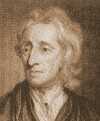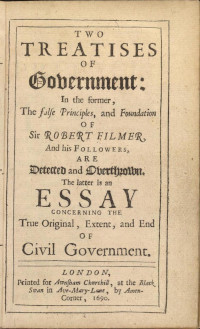
[R]eason ... teaches all Mankind, who will but consult it, That being all equal and independent, no one ought to harm another in his Life, Health, Liberty, or Possessions1.
[K]nowing precisely what our Words stand for, would ... in ... many ... cases ... end the dispute2.
John Locke (1632-1704) was born in an age of tracts and turmoil. He too was a tract-writer, sometimes an anonymous one. He confessed authorship of the Second Treatise on Civil Government only after he was dead—in his will.

Locke was a late bloomer. "It seems incredible that Locke, of all people, could have influenced individuals around the world," notes historian Jim Powell, a gifted chronicler of the fight for freedom through the ages. "When he set out to develop his ideas, he was an undistinguished Oxford scholar. He had brief experience with a failed diplomatic mission. He was a physician who long lacked traditional credentials and had just one patient. His first major work wasn't published until he was 57. He was distracted by asthma and other chronic ailments. ... Although he had a love affair which, he said, 'robbed me of the use of my reason,' he died a bachelor."3
When the wrong King ascended to the throne, Locke felt obliged to give England a wide berth. He spent a fair amount of time in Holland, breathing its free-thinking air as he developed his own famous free-thinking ideas.
Locke's Second Treatise offers a theoretical justification of private property—which could be acquired by "mixing one's labor" with the land—and of political rebellion. He doubtless had recent rebellious doings in England in mind as he drafted it. The work exerted a profound influence on the thought (and action) of the American Founding Fathers.
His Essay Concerning Human Understanding, with its defense of an empirical basis of knowledge as acquired by human beings born "tabula rasa" (i.e., with minds as blank tablets on which experience would write) was also seminal, and a frequent foil for later thinking in epistemology. The idea that even the noblest concepts could find their wellspring in the five senses was a shocker for those who believed that all the best thinking had something crucial to do with either "innate ideas" and/or eternal archetypes floating around somewhere in some timeless, boundless alternate dimension accessible only by intuition, dreams, and hard prayer.
The earthly kind of reasoning didn't come easy. Locke was finally able to send the Essay off to the printer only after twenty years of revision. He collected all of thirty pounds for his pains.
He offers this account of how the project came about:
[F]ive or six Friends meeting at my Chamber, and discoursing on a Subject very remote from this, found themselves quickly at a stand, by the Difficulties that rose on every side. After we had a while puzzled our selves, without coming any nearer a Resolution of those Doubts ..., it came into my Thoughts that we took a wrong course, and that before we set our selves upon Enquiries of that Nature, it was necessary to examine our own Abilities, and see, what Objects our Understandings were, or were not fitted to deal with. This I proposed to the Company, who all readily assented; and thereupon it was agreed, that this should be our first Enquiry. Some hasty and undigested Thoughts ... which I set down against our next Meeting, gave the first entrance into this Discourse ...4
So, apparently there is some benefit to these philosophical-salon type deals after all.
Copyright © 2000, The Daily Objectivist - Reprinted with permission of The Daily Objectivist and Davidmbrown.com.
6 Feb 2009 (last edit: 5 Jan 2024)
You can assist the work of Freedom Circle by purchasing one of the works discussed above:
-
John Locke, Two Treatises of Government: In the former, The false Principles, and Foundation of Sir Robert Filmer, And his Followers, are Detected and Overthrown. The latter is an Essay concerning the True Original, Extent, and End of Civil Government, London: Awnsham Churchill, 1690, Book II, Chapter II, p. 222. (Freedom Circle note) ↩︎
-
John Locke, An Essay Concerning Humane Understanding, in Four Books, third edition, London: Printed for Awnsham and John Churchill, and Samuel Manship, 1695, Book II, Chapter XIII, p. 89. (Freedom Circle note) ↩︎
-
Jim Powell, "John Locke—Natural Rights to Life, Liberty, and Property", The Freeman: Ideas on Liberty, Vol. 46, No. 8, August 1996, p. 577. (Freedom Circle note) ↩︎
-
John Locke, "The Epistle to the Reader", An Essay Concerning Humane Understanding, ibid., p. b3. (Freedom Circle note) ↩︎
